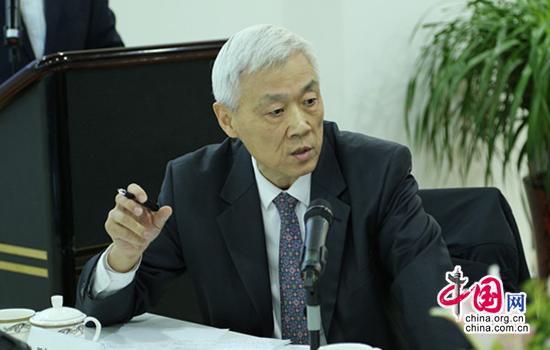Experts: China, Japan's mutual trust can prevent war
- By Zhang Rui
 0 Comment(s)
0 Comment(s) Print
Print E-mail China.org.cn, April 2, 2015
E-mail China.org.cn, April 2, 2015
He suggested separating political issues from military issues when establishing such a mechanism. Though he admitted that the path for creating the mechanism would not be smooth, he said the mechanism will have a huge positive impact on the two nations.
|
|
| Zhang Tuosheng, director of research at the China Foundation for International Strategic Studies, speaks at a roundtable on East China Sea crisis control in Beijing on March 31, 2015. [China.org.cn] |
Wang Chong, another researcher from the Charhar Institute, said the Diaoyu Islands dispute between China and Japan cannot be resolved in the next ten years, but the two governments have to be able to control possible accidental crises that the dispute may trigger.
"There will be no large-scale war between two countries, I think," Wang said. "Though the top-level dialogue almost stopped, the middle- and low-level dialogues between the two countries have never been suspended. In a sense, these kinds of dialogues are also a form of crisis control. "
Researcher Hong Yuan also noted that Japan should drop its attempts to get the United States involved as a military ally to deter and awe China. "China and Japan should go from strategic perspective and reach consensus on political and economic issues. Then military crisis control will come easily along the way."
Wang Jingtao, the deputy chief editor of ihaiyang.com.cn, added that any kind of crisis control will not resolve the two countries' disputes completely, but will "only improve the civil and folk communications between two peoples and resolve the historical issues. Then other issues can be really resolved."




Go to Forum >>0 Comment(s)